
Mediterranean Journal of Infection Microbes and Antimicrobials
Scope & Guideline
Unlocking insights into the realm of infectious microbes.
Introduction
Aims and Scopes
- Infectious Disease Epidemiology:
Research articles examining the prevalence, risk factors, and outcomes associated with infectious diseases across diverse populations, particularly in the Mediterranean region. - Microbial Pathogenesis and Resistance:
Studies exploring the mechanisms of pathogenicity of microorganisms, as well as their resistance patterns to antibiotics and antifungals, contributing to the understanding of treatment challenges. - Clinical Microbiology and Diagnostics:
Papers focused on laboratory diagnostics, including innovative techniques for identifying pathogens and evaluating their antimicrobial susceptibility, which are crucial for effective treatment strategies. - Therapeutic Interventions and Outcomes:
Research evaluating the efficacy and safety of various therapeutic interventions for infectious diseases, including novel antibiotics, antiviral agents, and antifungal therapies. - Emerging Infections and Public Health:
Investigations into new and re-emerging infections, their impact on public health, and the responses required to manage outbreaks, especially in the context of global health challenges.
Trending and Emerging
- COVID-19 Research:
A significant increase in studies related to COVID-19, including epidemiology, clinical outcomes, and vaccine efficacy, reflects the urgent need to understand and combat this global pandemic. - Antimicrobial Stewardship:
Emerging research on antimicrobial stewardship practices highlights efforts to optimize the use of antibiotics and antifungals in clinical settings, aiming to combat the growing threat of resistance. - Fungal Infections and Antifungal Resistance:
There is a notable uptick in research focused on invasive fungal infections and their management, particularly in immunocompromised patients, as well as studies addressing antifungal resistance patterns. - Artificial Intelligence in Diagnostics:
The integration of artificial intelligence and machine learning in the diagnosis and management of infections is becoming increasingly prevalent, indicating a trend toward leveraging technology for improved patient care. - Global Health Perspectives:
Research incorporating global health perspectives, particularly in relation to infectious disease outbreaks and their socio-economic impacts, is gaining traction, reflecting an interdisciplinary approach to public health.
Declining or Waning
- Traditional Antibiotic Therapy:
There has been a noticeable decrease in studies focusing solely on traditional antibiotics without considering newer agents or combination therapies, as the field increasingly shifts toward addressing antibiotic resistance and exploring innovative treatment options. - Non-communicable Disease Infections:
Research on infections related to non-communicable diseases appears to be waning, possibly due to a greater emphasis on acute infectious diseases, especially in light of recent global health crises. - Basic Laboratory Techniques:
Papers detailing basic laboratory methodologies and techniques may be declining as the field moves towards more advanced and automated diagnostic methods, reflecting a shift in research focus towards clinical applications and outcomes.
Similar Journals
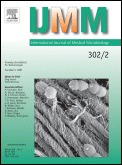
INTERNATIONAL JOURNAL OF MEDICAL MICROBIOLOGY
Bridging Microbiology and Clinical ExcellenceWelcome to the International Journal of Medical Microbiology, a leading publication in the field of microbiological research and infectious diseases, offered by Elsevier GmbH. Established in 2000, this esteemed journal provides a scholarly platform for the presentation of high-quality research, reviews, and innovations that bridge medical microbiology and clinical applications. With an impressive impact factor positioning it within the Q1 category across multiple disciplines, including Infectious Diseases, Microbiology, and Medicine, the journal is recognized for its rigorous peer-review process and significant contributions to advancing our understanding of microbial pathogenesis, diagnostics, and therapeutics. The International Journal of Medical Microbiology is committed to open access, promoting the dissemination of knowledge and accessibility for researchers, professionals, and students worldwide. Based in Munich, Germany, the journal continues to play a vital role in the global scientific community, fostering collaborations and inspiring future innovations in the fight against infectious diseases.
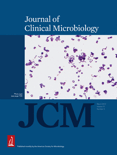
JOURNAL OF CLINICAL MICROBIOLOGY
Unveiling Innovations in Clinical MicrobiologyJOURNAL OF CLINICAL MICROBIOLOGY, published by the American Society for Microbiology, stands as a premier resource for researchers and professionals in the field of medical microbiology. With an illustrious history dating back to 1975, this journal has consistently provided high-impact research, reflecting its status in the Q1 category among microbiology (medical) journals, and an impressive Scopus rank of 14 out of 140, placing it in the 90th percentile. The journal's commitment to unveiling foundational and innovative studies greatly contributes to understanding human health challenges posed by microbial pathogens. Researchers can expect rigorous peer-reviewed articles that cover a spectrum of topics, from diagnostic methods to clinical epidemiology, fostering a deeper understanding of microbiology's role in healthcare. While this journal does not offer open access options, its substantial impact factor underscores its relevance in shaping the conversation in clinical microbiology. The JOURNAL OF CLINICAL MICROBIOLOGY is indispensable for anyone dedicated to advancing their knowledge and practical skills in microbiology.
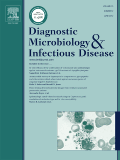
DIAGNOSTIC MICROBIOLOGY AND INFECTIOUS DISEASE
Exploring Innovations in Diagnostic MicrobiologyDIAGNOSTIC MICROBIOLOGY AND INFECTIOUS DISEASE, published by Elsevier Science Inc, is a leading journal in the fields of Infectious Diseases, Microbiology, and Medicine. Since its inception in 1983, this esteemed journal has consistently provided a platform for original research and comprehensive reviews that advance the understanding of diagnostic microbiology and its implications for infectious diseases. With an impressive impact factor placing it in the Q2 category in multiple relevant fields as of 2023, it stands out with Scopus rankings reinforcing its significance in academia, ranking #136 out of 344 in Infectious Diseases and #64 out of 140 in Medical Microbiology. This journal is essential for researchers, healthcare professionals, and students who seek to stay abreast of the latest developments and trends in infectious diagnostics. DIAGNOSTIC MICROBIOLOGY AND INFECTIOUS DISEASE is committed to fostering excellence in research quality and academic rigor, ensuring accessibility to vital knowledge for addressing some of the most pressing health challenges of our time.

New Microbiologica
Exploring the vital links between microorganisms and human health.New Microbiologica is a prominent academic journal published by EDIZIONI INT SRL, dedicated to advancing knowledge in the fields of Microbiology and Medicine. Since its inception in 1993, this journal has played a vital role in disseminating cutting-edge research, featuring articles that explore the intricate relationships between microorganisms and human health. With an H-index indicating a robust citation profile and a respectable 2023 Scopus Ranking placing it in the 32nd percentile for medicine microbiology, New Microbiologica resonates well within the academic community. Although not an Open Access journal, it is strategically positioned in Quartile 3 of both Medicine (miscellaneous) and Medical Microbiology categories, which reflects its importance to researchers and professionals seeking valuable insights in their fields. Published in Italy, the journal continues to provide a platform for impactful research through its commitment to high-quality publications, fostering collaboration and innovation among scientists and academics in the ever-evolving landscape of microbiological studies.

Jundishapur Journal of Microbiology
Advancing microbial knowledge for a healthier tomorrow.Welcome to the Jundishapur Journal of Microbiology, a peer-reviewed publication dedicated to advancing the field of microbiology. Published by BRIEFLAND, this journal focuses on key areas such as infectious diseases and medical microbiology, offering a platform for researchers to share their findings from 2009 to 2024. Despite its current positioning in Quartile 4 across various categories in 2023, the journal provides a valuable resource for budding scientists and established professionals alike, contributing to the growing body of knowledge in these critical areas. While it is not an open-access journal, the Jundishapur Journal prioritizes the dissemination of research in the Netherlands, facilitating a deeper understanding of microbial science and its implications for public health. Join a community of innovators committed to exploring both emerging and established themes in microbiology.
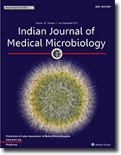
Indian Journal of Medical Microbiology
Pioneering Research in Medical Microbiology Since 1986Indian Journal of Medical Microbiology, published by Elsevier, is a pivotal peer-reviewed journal dedicated to the field of medical microbiology, providing a vital platform for research and scholarship since its inception in 1986. With an Open Access model established in 2001, it ensures the dissemination of scientific knowledge to a global audience, enhancing accessibility for researchers, professionals, and students alike. The journal's scope spans critical areas including immunology, infectious diseases, and microbiology, with an impressive trajectory marked by converged years of publication allowing for a comprehensive exploration of evolving scientific trends. As of 2023, the journal holds a Q3 ranking in Infectious Diseases and Microbiology (medical) and a Q4 ranking in Immunology and Microbiology categories, reflecting its significant yet growing impact in the field. Researchers seeking to contribute to or stay updated on the latest advancements in medical microbiology will find the Indian Journal of Medical Microbiology a valuable resource, as it consistently bridges the gap between emerging science and clinical application.

Lancet Microbe
Bridging Gaps in Infectious Disease ResearchThe Lancet Microbe is a leading peer-reviewed journal published by ELSEVIER, focused on advancing research in the fields of infectious diseases, microbiology, and virology. Since its inception in 2020, this open-access journal has rapidly achieved a prestigious reputation, evidenced by its impressive rankings in the Scopus Ranks, where it holds positions within the top 10 in multiple categories and boasts high percentiles, reflecting the impact and relevance of its published works. With a quarterly publication schedule, the Lancet Microbe aims to disseminate critical findings and foster innovation within the scientific community, providing a platform for researchers and professionals to share their significant contributions. The journal is committed to facilitating knowledge exchange and accessibility, making it an essential resource for academicians and practitioners dedicated to addressing global health challenges.
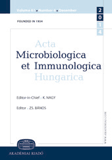
ACTA MICROBIOLOGICA ET IMMUNOLOGICA HUNGARICA
Innovating research for a healthier tomorrow.ACTA MICROBIOLOGICA ET IMMUNOLOGICA HUNGARICA is a distinguished academic journal published by AKADEMIAI KIADO ZRT, focusing on significant advancements in the fields of microbiology, immunology, and infectious diseases. Established in 1994, this journal serves as a vital platform for researchers, professionals, and students keen on exploring the complexities of microbial interactions and immune responses. With a current Impact Factor reflecting its rank within the Q3 categories for Immunology, Microbiology, and Infectious Diseases, it retains a critical position in disseminating innovative research. Although not open access, the journal provides extensive insights disseminated through various academic databases, ensuring a broad reach within the scholarly community. Its convergence over three decades indicates a robust commitment to excellence in scientific inquiry and knowledge sharing. As it moves towards the future, ACTA MICROBIOLOGICA ET IMMUNOLOGICA HUNGARICA continues to uphold its legacy of fostering collaborative research initiatives that contribute to the understanding and treatment of microbial diseases globally.

Reviews and Research in Medical Microbiology
Pioneering Insights into Pathogens and HealthReviews and Research in Medical Microbiology is a premier academic journal published by LIPPINCOTT WILLIAMS & WILKINS, focusing on groundbreaking research and comprehensive reviews that advance the understanding of medical microbiology. With an ISSN of 2770-3150 and an E-ISSN of 2770-3169, this journal serves as an essential resource for researchers, healthcare professionals, and students dedicated to the study of pathogens, infectious diseases, and microbial mechanisms affecting health. While the journal currently does not offer open access, its rigorous peer-review process ensures that only high-quality, impactful research is disseminated to the scientific community. The journal aims to bridge gaps in knowledge by presenting cutting-edge studies that explore novel therapeutic strategies, diagnostic methods, and the evolving landscape of microbial resistance. Nestled in the heart of Philadelphia, this journal proudly contributes to the advancement of medical microbiology and is an indispensable platform for the publication of critical findings that shape clinical practices and research trajectories in the field.
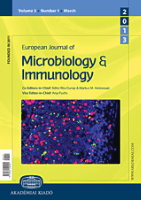
European Journal of Microbiology and Immunology
Fostering Innovation in Immunological StudiesWelcome to the European Journal of Microbiology and Immunology, a premier platform dedicated to advancing the field of microbiology and immunology through the dissemination of high-quality research. Published by AKADEMIAI KIADO ZRT in Hungary, this journal serves as an essential resource for researchers, professionals, and students alike, fostering scholarly communication and innovation in these critical areas of medical science. The journal, which holds an ISSN of 2062-8633, presents rigorously peer-reviewed articles that contribute to our understanding of microbial diseases, immune responses, and related fields, currently ranking in the Q2 and Q3 quartiles across multiple categories such as immunology and microbiology. By embracing an inclusive scholarly dialogue and offering a robust readership, the European Journal of Microbiology and Immunology aims to inspire the next wave of discoveries and collaborations within the global scientific community.